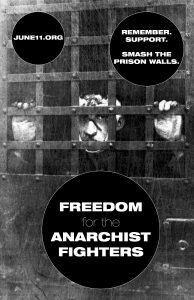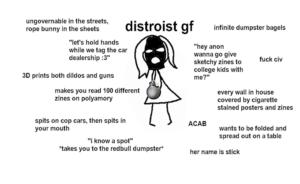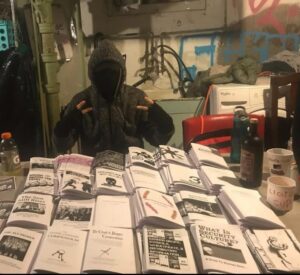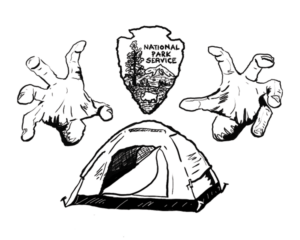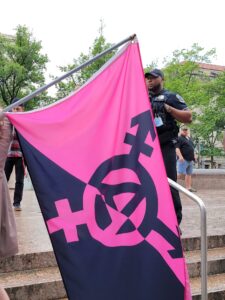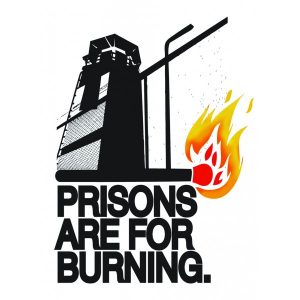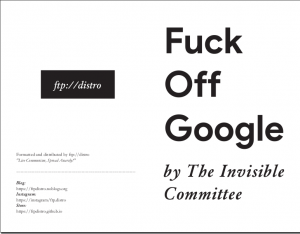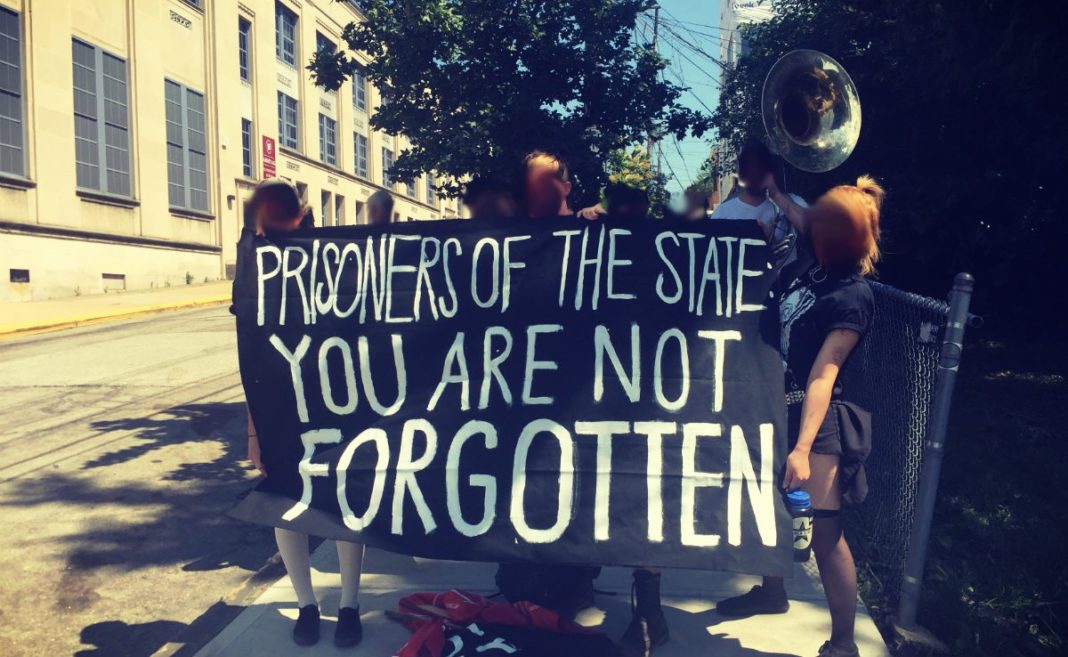
2021 Callout [En Español]
2021 Callout [Deutsch]
2021 Callout [Finnish]
2021 Callout [Français]
2021 Callout [Nederlands]
[PDF for printing] [PDF for reading]
Against another year of state encroachment, against the restriction of free movement under the auspices of “safety,” against the continued brutalization of our friends in prison, we call for a renewal of solidarity on June 11, 2021: International Day of Solidarity with Marius Mason & All Long-Term Anarchist Prisoners. For 17 years, June 11th has been an occasion for celebration, mourning, and revolt. It has been a moment to breathe, to remember those fallen and those in cages, to remind ourselves of why we remain committed to the Beautiful Idea of anarchism. Through our letters, demonstrations, fundraising, and solidarity attacks we keep the beacon lit for those who have given years of their lives for their conviction that the State is a horror against which we must wager our lives.
MEMORY REMAINS A WEAPON
June 11th is, in the words of Christos Tsakalos, a day against oblivion. The architects of prison society would have prison function as a memory hole, casting our dear rebels into the void and producing in free souls a stifling amnesia. They want us to forget those who took action against the state and economy and those who continue their rebellion behind bars. Our work of solidarity with imprisoned anarchists is a hammer blow against forgetting: against the prison walls and the narcotizing technological society that shatters all meaning.
As such, we remember not only our friends behind bars, but those who have died. Marilù Maschietto in Italy. Former political prisoner Alexei “Socrates” Sutuga in Russia. Robert D’Attilio, who kept alive the memory of Sacco & Vanzetti. Doris Ensinger, whose decades of activity as a subversive, organizer, and author stretches from the student revolt of the ’60s to the present. Tireless anarchist abolitionist Karen Smith. Lucio Urtubia, whose life of expropriation in service of struggle remains an inspiration.
Finally: Stuart Christie. Stuart’s life and example cast a massive shadow in our efforts. From his time as a young prisoner in Franco’s Spain and his reanimation of the Anarchist Black Cross in the 1970s, to his persecution in the Angry Brigade trials and work in archiving anarchist history through Cienfuegos Press and Christie Books, Stuart’s tireless work will not be forgotten. He and all of our fallen companions, whether we knew them personally or not, are alive in spirit in our work this year.
TO COMBAT THE PRESENT ORDER
Prison administrations around the world have responded to the COVID-19 pandemic by implementing lockdowns and banning in-person visits, building upon prior movement to replace face-to-face visits with video chat. Physical mail is also threatened, with the United States federal prison system initiating a program to scan letters and make them only accessible on expensive tablets provided by a contracted company, Smart Communications. This allows for easier surveillance and is lucrative for Smart Communications, who can charge exorbitant rates for access to its services. It’s likely that this trend will continue in prisons around the world. With the pandemic as an alibi, prison administrations and profiteering companies have accelerated the abolition of direct human connection and the shifting of prisoners’ lives into the techno-sphere. Anarchist prisoners have been on the forefront of opposition to this regime of control, with anarchist prisoner Mónica Caballero going on hunger strike in 2020 to demand restoration of in-person visits.
REBELLION & REACTION
A year after George Floyd was murdered, our context is still strongly infused by the surge of protests, riots, and organizing that followed. In addition to the new energy, friendships, and practices that came out of the uprising, the repression that followed will affect us and our struggles for years to come. Over 13,000 arrests were made, with at least a few hundred state-level felony cases and over 325 federal cases. An unknown number have already taken pleas or are still incarcerated pretrial. Those arrested include all kinds of people: some young, some old; some long-term activists, some newly radicalized; some very connected to movements or struggles, and some very isolated. Existing bail funds and jail support projects have greatly expanded their reach, and many new ones have popped up all over the country. And some have already begun to contract, due to activity in the streets slowing down and from over-work in unsustainable models. These are part of the same continuum of anti-repression as supporting our long-term prisoners.
Some uprising defendants will most likely end up serving long prison sentences. While both immediate jail support and long-term prisoner support continue, we are now in a collective transition period between the two. Bail/jail support, court support, and prisoner support must all be done in a way that makes us stronger instead of draining us. Some connections have already begun to be made between movement prisoners and the uprising in the streets. Jeremy Hammond and friends recorded a video of a small protest and message of solidarity from Grady County Jail. Former black liberation political prisoner Dhoruba Bin-Wahad spoke about a BLM that means Black Liberation Movement and the importance of political education. This year, we seek to deepen the connection between different aspects of anti-repression, to bring the names and the wisdom of our long-term prisoners into current struggles – whether that’s in the streets against the police, in the forest against pipelines, or in the night against monuments of power – and strengthen networks and practices to support more comrades going to prison.
